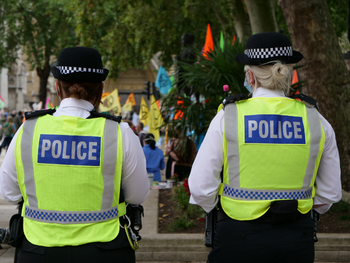Expert comment Last updated 06 March 2023

Jonathan Jackson, Senior Teaching Fellow for Policing and Security at Birmingham City University, provides expert comment.
The recently leaked Matt Hancock WhatsApp messages provide the public with evidence of the realities of the now famous Napoleonic quote that ‘no plan survives contact with the enemy’.
The former health secretary’s comments regarding the matter raise the question, what do politicians think the role of the police is?
Is it to police without bias; maintain transparency and accountability for decision-making; or enforce the political will of those in charge?
Matt Hancock’s comments regarding getting ‘heavy with the police’ on lockdown restrictions suggest a lack of understanding of the role, function and realities of policing in England and Wales within central government at the time.
Financial cuts and public trust
The sheer chaos that the Covid-19 pandemic caused at all levels of state governance, demonstrated how years of pre-planning by agencies meant little when faced with the ferocity of the virus and how response planning could not handle the realities in which they were designed.
Policing in England and Wales has suffered from decades of financial cuts, increasing levels of demand and falling officer retention.
The ‘Uplift programme’ has led to an increased number of available officers, but this is being offset by the loss of experienced staff through ill health, retirement, or fatigue.
Policing doesn’t have the numbers to control and enforce rules on the scale it was being asked to during the pandemic and instead relied upon public trust and confidence in its legitimate authority to maintain control.
The restrictions imposed during the pandemic lacked clarity, with much of the confusion of enforcement based on misunderstandings between guidance and legislation.
Policing in England and Wales must be rooted in law enforcement but also discretionary practice and delivering a quality service to the public.
Uncertain messaging and government guidance
The extraordinary circumstances during the pandemic required officers to enforce powers which many did not feel comfortable with as it challenged the principles of democratic policing.
The control of behaviours on that scale would not have been successful without national acceptance and increased levels of enforcement would not have been appropriate and likely to have created a violent backlash.
As with other challenging times of national crisis the public had to recognise the risk posed and that increased levels of authority were put in place to counter the immediate threat, not a long-term shift in style.
Our localised model will mean that forces will often need to take decisions based on the needs of their geographical areas, trying their best to interpret the central government’s demands. Much of the confusion felt by the public and officers themselves could have been due to the uncertain messaging and guidance provided by the government.
The evidence provided by these messages, in which politicians blame poor enforcement, suggests a serious lack of understanding of the realities for many on the ground.